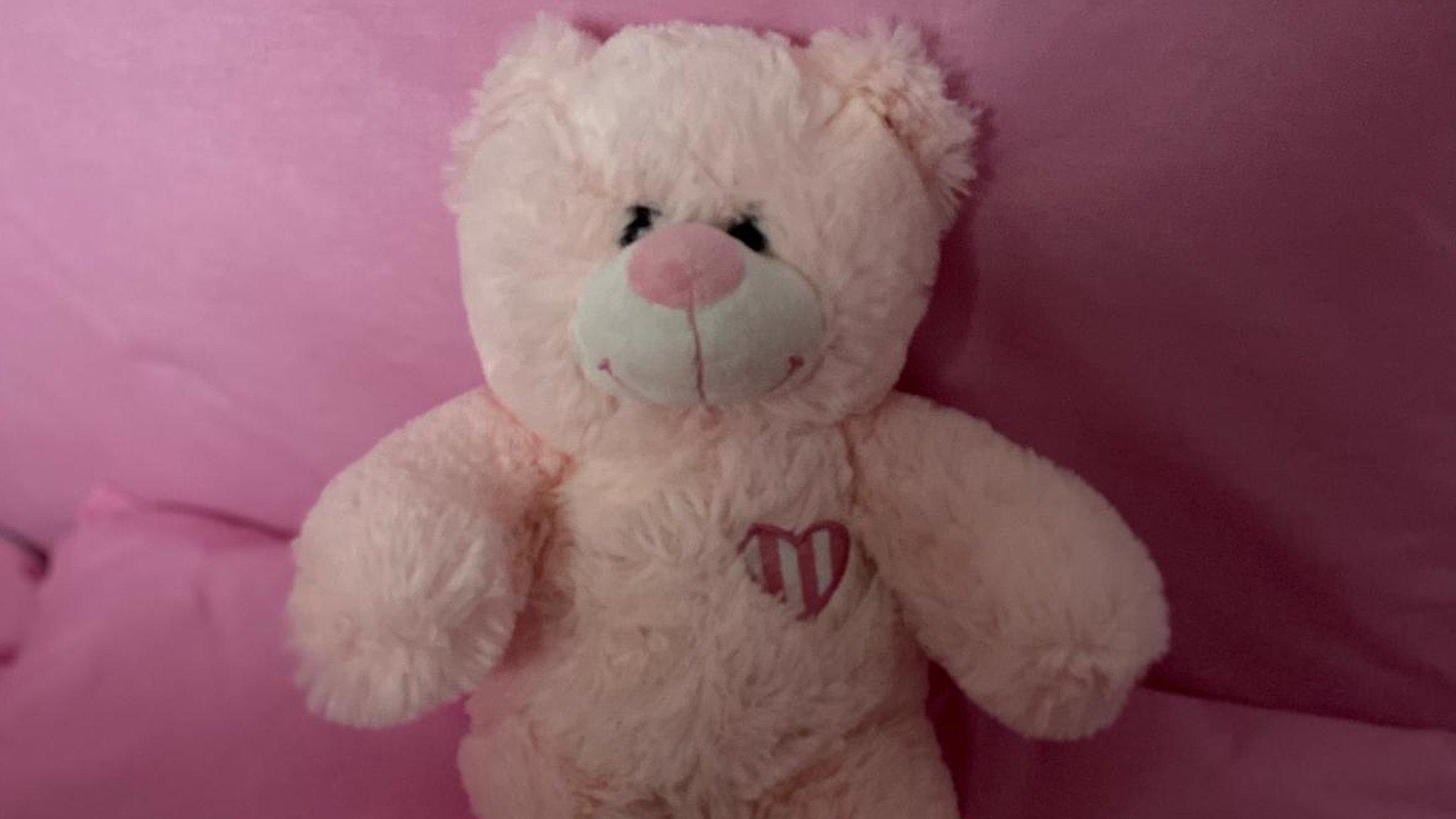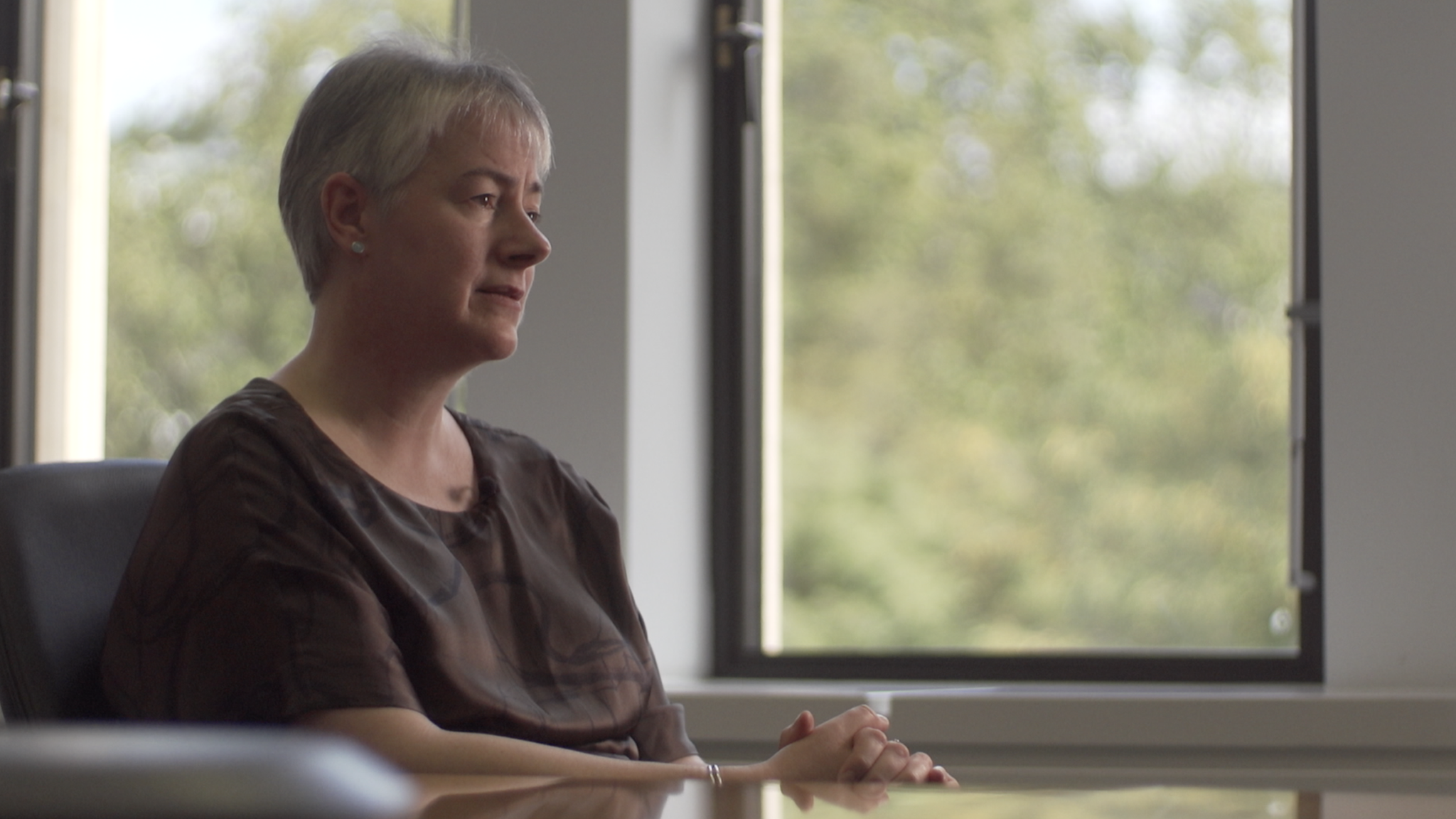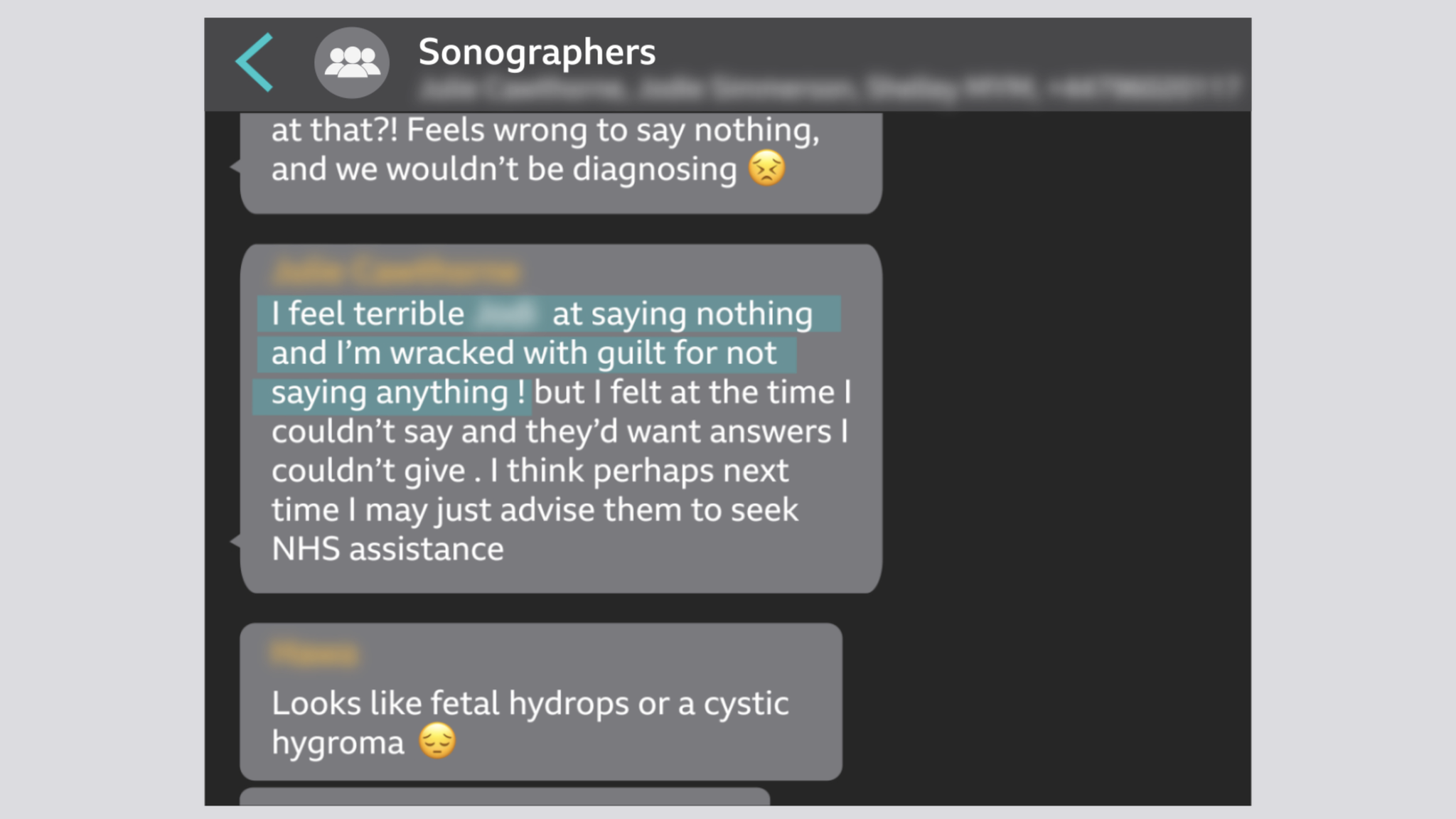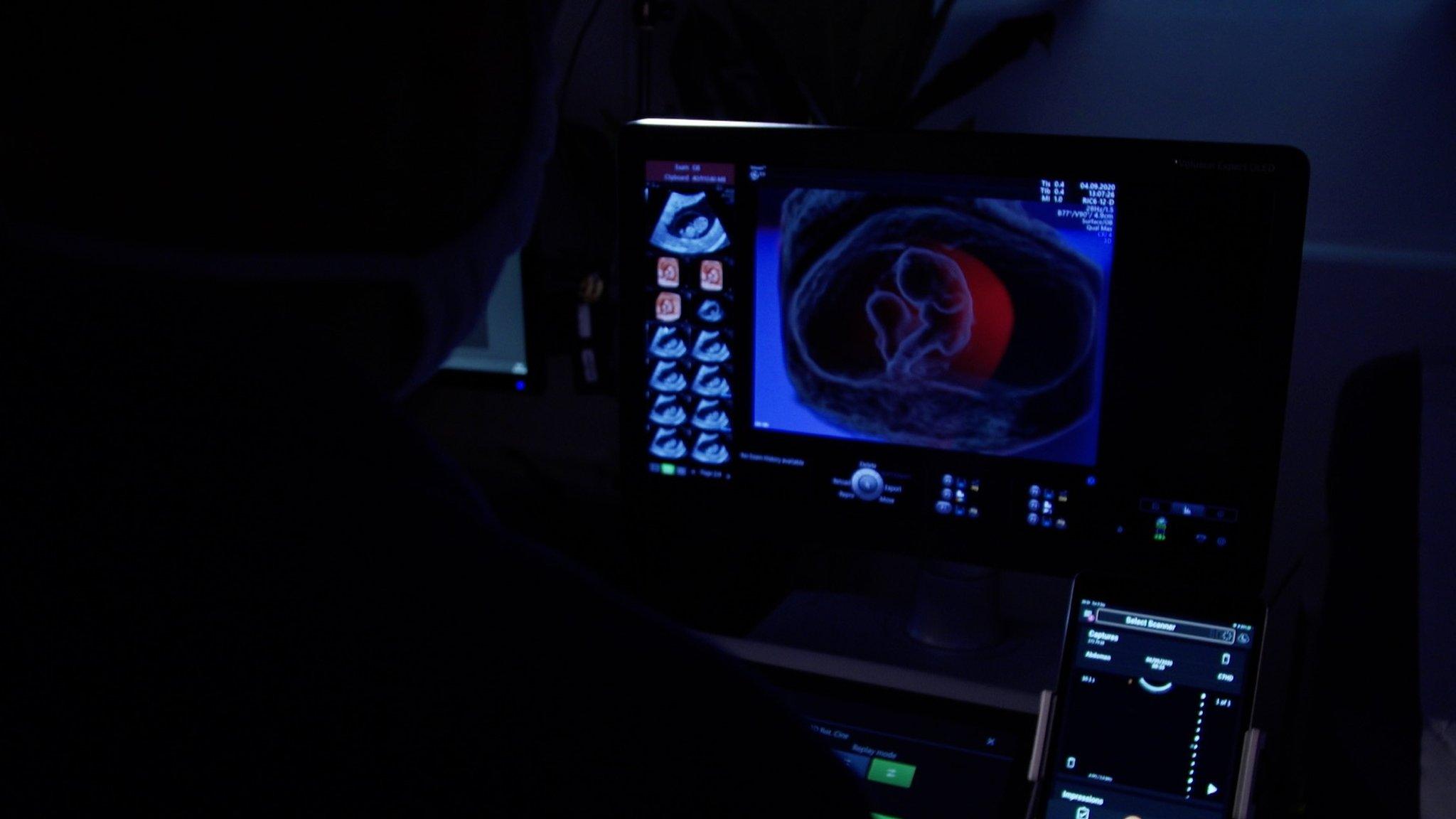Private baby scans show 'incredibly poor practice'
- Published
WATCH: BBC News uncovers evidence that women have not been told about serious abnormalities
A BBC News investigation has uncovered failures in the diagnosis of serious medical issues during private baby scans.
More than 200 studios across the UK now sell ultrasound scans, with hundreds of thousands being carried out each year.
But the BBC has found evidence of women not being told about serious conditions and abnormalities.
The Care Quality Commission says there is good quality care in the industry but it has a "growing concern".
Private baby scanning studios offer a variety of services.
Some diagnose medical issues while others market themselves as providers of souvenir images or video of the ultrasound. Most sell packages providing a "reassurance scan" to expectant mums.
The growing popularity of gender reveal parties means many women visit private baby scan studios to buy confetti cannons and balloons which unveil the sex of their baby after the scan.
Many women BBC News spoke to said they had positive experiences at private studios, but we have also learned of instances where women said they were failed.
'I was distraught'
Charlotte, from Manchester, attended a scan in Salford with one of the biggest franchises, Window to the Womb, to record her baby's sex for a party and check its wellbeing.
BBC News has learned the sonographer identified a serious abnormality that meant the baby could not survive, where part or all of its head is missing, called anencephaly.
But rather than refer her immediately to hospital and provide a medical report, Charlotte was told the baby's head could not be fully seen and recommended to book an NHS anomaly scan.
She was also given a gender reveal cannon and a teddy bear containing a recording of its heartbeat as a present for her daughter.
Charlotte only found out the baby could not survive the day after her gender reveal party, when she showed scan images to a family friend who was an experienced sonographer.
"I was distraught," Charlotte said. "You've bonded with that baby."
"To get that news the next day, I then had to go and tell every single one of those people what happened.
"It's like a deep cut feeling," she added. "All of it could have just been avoided, we could have processed the news all together as a family because I was with my mum and dad, I would have had the support there."

Charlotte was given a teddy bear containing her baby's heartbeat even though the scan showed it could not survive
Window To The Womb has said all its staff are registered with the Health and Care Professions Council but BBC News has learned the sonographer who conducted the scan was not.
The company said: "An anomaly was identified however the communication from the sonographer was not to the standard that we expect."
It apologised to Charlotte at the time. It says that the sonographer left shortly afterwards and the incident led to best practice being reinforced across its branches.
'The trickiest time'
The profession of those scanning women, sonography, is not regulated like midwifery or radiography, leading some to question the quality of private baby scans and their interpretation.
"You're doing the most difficult scans at the trickiest time for the most anxious group of people with a workforce that you don't necessarily know their level of skills, expertise and what training they've actually had," said Jeanette Dickson, president of the Royal College of Radiologists.
Almost all sonographers are regulated separately as radiographers or midwives in the NHS, as are many in private studios.
But Dr Dickson says regulation of sonographers is necessary because of the growth of the industry.
"It matters now because of the massive increase in these companies," she said.

Dr Dickson says regulation of sonographers is needed
Some baby scan studios say they do not diagnose medical problems but still sell scans offering "reassurance" which typically detect a heartbeat.
One of these companies, Meet Your Miracle, advertises scans which its website says "visualise" wellbeing.
BBC News has seen messages from a WhatsApp group of the company's management and sonographers which shared and reviewed customer scans, sometimes during appointments.
One sonographer told the group she felt guilty after having to let a woman leave without informing her of a possible abnormality identified by a colleague as potentially being foetal hydrops, which has a very low chance of survival.
"I knew something was wrong straight away, didn't know what to do," reads one message from the sonographer.
Shortly after, she added: "I feel terrible at saying nothing and I'm wracked with guilt for not saying anything."

Messages from one company WhatsApp group reveal anxiety over not informing a woman about a potential abnormality
Despite being a non-medical company, a former employee told the BBC women who were bleeding and in pain were accepted for scans, rather than being recommended to immediately contact the NHS.
Meet Your Miracle says its scans are largely "recreational" and under its registration it cannot discuss any concerns unless they are relevant to the baby's heartbeat nor offer a potential diagnosis which requires further tests by the NHS.
It says it advises women bleeding and in pain to attend the NHS.
The NHS says bleeding during pregnancy is relatively common but advises women to contact their midwife or GP, external if bleeding from their vagina.
BBC News looked at the practices of many private companies and also uncovered concerns about how the industry operates more widely including:
Failure to diagnose an ectopic pregnancy and multiple spina bifida cases
Women undergoing private baby scans more than a dozen times during pregnancies not regarded as high risk. The NHS provides two scans unless there is a clinical need for more
A studio which has not been inspected by the Care Quality Commission (CQC) in England four years after opening
Companies offering non-essential '4D' scans during lockdown which visualise the foetus but have no medical benefit to women
Use of doppler function to listen to heartbeats of foetuses under 12 weeks despite NICE guidance recommending against routine use in low-risk pregnancies
The findings reveal a "catalogue of incredibly poor practice", according to Jacqueline Torrington, a lecturer in medical ultrasound at City University London.
"[There is] an entire range of harms here, which are completely unnecessary," she said.
"It ranges from incredibly dangerous to anxiety inducing to false reassurance."

Women were allowed to bring partners to many private scans, but not NHS ones, early in the coronavirus pandemic
'Growing concern'
In England, all studios must register with the CQC, which regulates the care provided by services.
But BBC News has learned the CQC does not review samples of scans as part of its inspections and found a studio which had not been inspected since opening four years ago.
The CQC says it bases decisions over which studios to inspect on "information of concern" or according to risk.
It says there is good quality care in the industry as a whole but it has a "growing concern".
Studios need only register with the regulator in Scotland if they are run by registered healthcare professionals. In Wales, businesses have to register only if a doctor is employed to interpret scans.
In a statement, the government said: "We are committed to appropriate regulations for all health and care professions so patients can feel confident their care has been placed in safe and qualified hands."
Northern Ireland's Department of Health said it was not aware of any baby scan studios.
NHS advice for pregnant women can be found here, external.
More from Noel on Twitter @noeltitheradge, external

What are your experiences of private baby scan studios? You can get in touch in the following ways:
Please include a contact number if you are willing to speak to a BBC journalist.
WhatsApp: +44 7756 165803
Tweet: @BBC_HaveYourSay, external
Please read our terms & conditions and privacy policy
If you are reading this page and can't see the form you will need to visit the mobile version of the BBC website to submit your question or comment or you can email us at HaveYourSay@bbc.co.uk, external. Please include your name, age and location with any submission.